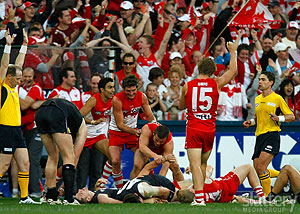
We’ve all got different methods for predicting the imminent round’s results. Most punters can’t go past the familiar benchmarks of form, ladder position, or home ground advantage. The injury list is another critical factor, with the serious tipsters scrutinising the names of every war-torn combatant.
For the most devout followers, heart-driven allegiances are added to the complex equation; they wouldn’t tip against their beloved even if they were tanking.
The alleged experts, meanwhile, will salvage through the archives in search of that elusive x-factor, citing that Team A has never drawn with Team B the week after defeating Team C by exactly 18 points.
As helpful as these indications are, though, it’s hard to go past the ostensibly logical “water-cooler principle”.
Such a tactic – also practiced heavily within the confines of social networking – takes only one factor into consideration.
Results.
On face value, it’s a common sense recipe. That is, since Sydney beat Essendon in Round 2, and Essendon toppled the Bulldogs in the opening round, it’s only reasonable to believe that the Swans will overcome the Bulldogs this coming Saturday.
Such a system, however, begins to hit some hurdles when we apply it to, say this Sunday’s Melbourne-Adelaide clash.
As the mathematically-savvy tipster you are, it’s only rational to jump behind the Crows. After all, Adelaide defeated Hawthorn, and Hawthorn thrashed Melbourne. Thus the Crows will inevitably prosper against the Demons.
The problems arise, however, when your associate uses this very same reasoning to refute you. They will remind you that Melbourne defeated Gold Coast, that Gold Coast prevailed against Port Adelaide, and that Port Adelaide won this year’s South Australian derby.
Going by their evidence, it makes just as much sense for the Demons to take home Sunday’s riches.
The verbal jousting will continue back and forth once the respective margins and percentages are thrown into the mix, but the outcome is always the same. Both parties will be left scratching their temples, trying to get their heads around the messy theory they’ve so foolishly let out of the bag.
Regardless of its apparent flaws, this structure is nevertheless likely to remain at the helm of football discourse for decades to come. Fans of Gold Coast and other cellar dweller teams, in particular, will inevitably whip it out should their team claim an unlikely scalp.
After all, under this system, Gold Coast’s handful of fans can not only celebrate their solitary victory over Port Adelaide, but can argue that they are the superior team to all of Adelaide, Hawthorn, St Kilda, Melbourne, Brisbane, Richmond, West Coast, and the Kangaroos. And the list will only grow larger.
If there’s anything that this line of logic does teach us, it’s that a loss to a mediocre side can have lasting consequences. It may only be four points on paper, but beside the water-cooler it makes a world of a difference.
Colleagues, eager to ignore their disappointing tipping scores and the listless efforts of their dearly loved team, will search for any excuse – no matter how unreasonable – to prove, for example, that the Tigers are in fact more superior to the Magpies.
For the players of Collingwood and Geelong, then, the message is clear; don’t stop winning. The most credible sides in the competition don’t lose points to second-rate affiliates.
For the hapless Brisbane, it’s a different story.
With finals hopes draining, all they have to do is salvage a victory somewhere, to give the fans something to boast about. The bigger the scalp, the better, but even the Suns will do.
As for the Suns, though, the instructions are even simpler. Having tasted first-year success already, the boys from the north can now take a much-earned break.
In fact, all that’s left for them to do is barrack loudly for the Power and co.





























































































